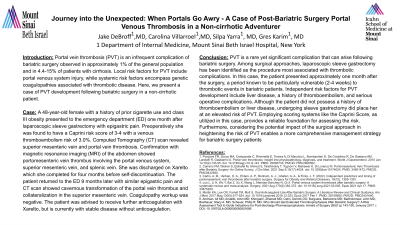Sunday Poster Session
Category: Liver
P1087 - Journey into the Unexpected: When Portals Go Awry - A Case of Post-Bariatric Surgery Portal Venous Thrombosis in a Non-Cirrhotic Adventurer
Sunday, October 22, 2023
3:30 PM - 7:00 PM PT
Location: Exhibit Hall

Has Audio
- JD
Jake Debroff, MD
Mount Sinai Beth Israel
New York, NY
Presenting Author(s)
Jake Debroff, MD1, Carolina Villarroel, MD2, Gres Karim, MD1, Silpa Yarra, MD1
1Mount Sinai Beth Israel, New York, NY; 2Mount Sinai Beth Israel Hospital, New York, NY
Introduction: Portal vein thrombosis (PVT) is an infrequent complication of bariatric surgery observed in approximately 1% of the general population and in 4.4-15% of patients with cirrhosis. Local risk factors for PVT include portal venous system injury, while systemic risk factors encompass genetic coagulopathies associated with thrombotic disease. Here, we present a case of PVT development following bariatric surgery in a non-cirrhotic patient.
Case Description/Methods: A 48-year-old female with a history of prior cigarette use and class III obesity presented to the emergency department (ED) one month after laparoscopic sleeve gastrectomy with epigastric pain. Preoperatively she was found to have a Caprini risk score of 3-4 with a venous thromboembolism risk of 3.0%. Computed Tomography (CT) scan revealed a superior mesenteric vein and portal vein thrombosis. Confirmation with magnetic resonance imaging (MRI) of the abdomen showed portomesenteric vein thrombus involving the portal venous system, superior mesenteric vein, and splenic vein. She was discharged on Xarelto which she completed for four months before self-discontinuation. The patient returned to the ED 9 months later with similar epigastric pain and CT scan showed cavernous transformation of the portal vein thrombus and collateralization in the superior mesenteric vein. Coagulopathy workup was negative. The patient was advised to receive further anticoagulation with Xarelto, but is currently with stable disease without anticoagulation.
Discussion: PVT is a rare yet significant complication that can arise following bariatric surgery. Among surgical approaches, laparoscopic sleeve gastrectomy has been identified as the procedure most associated with thrombotic complications. In this case, the patient presented approximately one month after the surgery, a period known to be particularly vulnerable (2-4 weeks) to thrombotic events in bariatric patients. Independent risk factors for PVT development include liver disease, a history of thromboembolism, and serious operative complications. Although the patient did not possess a history of thromboembolism or liver disease, undergoing sleeve gastrectomy did place them at an elevated risk of PVT. Employing scoring systems like the Caprini Score, as utilized in this case, provides a reliable foundation for assessing the risk. Furthermore, considering the potential impact of the surgical approach in heightening the risk of PVT enables a more comprehensive management strategy for bariatric surgery patients.
Disclosures:
Jake Debroff, MD1, Carolina Villarroel, MD2, Gres Karim, MD1, Silpa Yarra, MD1. P1087 - Journey into the Unexpected: When Portals Go Awry - A Case of Post-Bariatric Surgery Portal Venous Thrombosis in a Non-Cirrhotic Adventurer, ACG 2023 Annual Scientific Meeting Abstracts. Vancouver, BC, Canada: American College of Gastroenterology.
1Mount Sinai Beth Israel, New York, NY; 2Mount Sinai Beth Israel Hospital, New York, NY
Introduction: Portal vein thrombosis (PVT) is an infrequent complication of bariatric surgery observed in approximately 1% of the general population and in 4.4-15% of patients with cirrhosis. Local risk factors for PVT include portal venous system injury, while systemic risk factors encompass genetic coagulopathies associated with thrombotic disease. Here, we present a case of PVT development following bariatric surgery in a non-cirrhotic patient.
Case Description/Methods: A 48-year-old female with a history of prior cigarette use and class III obesity presented to the emergency department (ED) one month after laparoscopic sleeve gastrectomy with epigastric pain. Preoperatively she was found to have a Caprini risk score of 3-4 with a venous thromboembolism risk of 3.0%. Computed Tomography (CT) scan revealed a superior mesenteric vein and portal vein thrombosis. Confirmation with magnetic resonance imaging (MRI) of the abdomen showed portomesenteric vein thrombus involving the portal venous system, superior mesenteric vein, and splenic vein. She was discharged on Xarelto which she completed for four months before self-discontinuation. The patient returned to the ED 9 months later with similar epigastric pain and CT scan showed cavernous transformation of the portal vein thrombus and collateralization in the superior mesenteric vein. Coagulopathy workup was negative. The patient was advised to receive further anticoagulation with Xarelto, but is currently with stable disease without anticoagulation.
Discussion: PVT is a rare yet significant complication that can arise following bariatric surgery. Among surgical approaches, laparoscopic sleeve gastrectomy has been identified as the procedure most associated with thrombotic complications. In this case, the patient presented approximately one month after the surgery, a period known to be particularly vulnerable (2-4 weeks) to thrombotic events in bariatric patients. Independent risk factors for PVT development include liver disease, a history of thromboembolism, and serious operative complications. Although the patient did not possess a history of thromboembolism or liver disease, undergoing sleeve gastrectomy did place them at an elevated risk of PVT. Employing scoring systems like the Caprini Score, as utilized in this case, provides a reliable foundation for assessing the risk. Furthermore, considering the potential impact of the surgical approach in heightening the risk of PVT enables a more comprehensive management strategy for bariatric surgery patients.
Disclosures:
Jake Debroff indicated no relevant financial relationships.
Carolina Villarroel indicated no relevant financial relationships.
Gres Karim indicated no relevant financial relationships.
Silpa Yarra indicated no relevant financial relationships.
Jake Debroff, MD1, Carolina Villarroel, MD2, Gres Karim, MD1, Silpa Yarra, MD1. P1087 - Journey into the Unexpected: When Portals Go Awry - A Case of Post-Bariatric Surgery Portal Venous Thrombosis in a Non-Cirrhotic Adventurer, ACG 2023 Annual Scientific Meeting Abstracts. Vancouver, BC, Canada: American College of Gastroenterology.
